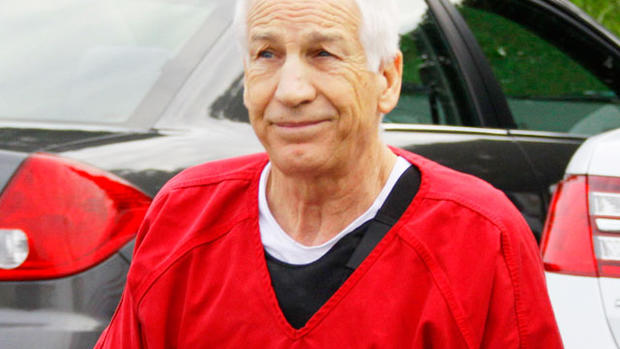Probe condemns Penn State for Sandusky inaction
(CBS/AP) STATE COLLEGE, Pa. - Penn State's internal investigation into the Jerry Sandusky scandal found that senior leaders at the university displayed "total disregard" for the children victimized by the former assistant football coach.
A team led by former federal judge and FBI director Louis Freeh interviewed hundreds of people to learn how the university responded to warning signs that its once revered former defensive coordinator — a man who helped Hall of Fame football coach Joe Paterno win two national titles while touting "success with honor" — was a serial child molester.
"Our most saddening and sobering finding is the total disregard for the safety and welfare of Sandusky's child victims by the most senior leaders at Penn State," Freeh says in prepared remarks released in advance of a press conference. "The most powerful men at Penn State failed to take any steps for 14 years to protect the children who Sandusky victimized."
Freeh says the investigation found that Paterno; athletic director Tim Curley; Gary Schultz, a university vice president who oversaw the campus police department; former university president Graham Spanier "never demonstrated, through actions or words, any concern for the safety and well-being of Sandusky's victims until after Sandusky's arrest."
Paterno died from lung cancer in January at age 85, two months after being fired as coach following Sandusky's arrest.
In advance of the report, Paterno's family conducted damage control, issuing a lengthy statement disputing recent reports suggesting he may have tried to protect Sandusky. It said, in part: "Joe Paterno did not know that Jerry Sandusky was a pedophile. Joe Paterno did not act in any way to prevent a proper investigation of Jerry Sandusky."
On Wednesday, the family released a document purportedly a future op-ed column written by Paterno less than a month before his death. In the piece, he defends the football program's integrity and rejects the notion that Sandusky's sexual abuse of boys amounted to a "football scandal" or in any way tarnished the accomplishments of his players or Penn State's reputation as a whole.
The Paterno family said the letter was given in draft form to a few former players around December. One of the ex-players circulated it to other former players this week.
"Over and over again, I have heard Penn State officials decrying the influence of football and have heard such ignorant comments like Penn State will no longer be a 'football factory' and we are going to 'start' focusing on integrity in athletics," Paterno wrote. "These statements are simply unsupported by the five decades of evidence to the contrary — and succeed only in unfairly besmirching both a great university and the players and alumni of the football program who have given of themselves to help make it great."
Paterno also wrote, "This is not a football scandal and should not be treated as one."
From the moment the sex scandal broke back in November, the specter of a cover-up by high-ranking university officials hung over Happy Valley like a shroud, CBS News chief investigative correspondent Armen Keteyian reports. In response, Penn State's Board of Trustees hired Freeh, who promised to conduct "a thorough, fair, comprehensive" investigation "without fear or favor."
The board has already acted on five initial recommendations made by Freeh, including revising its policy overseeing the treatment of minors, Keteyian reports.
Special Section: The Penn State Scandal
Joe Paterno defended football program in letter
Jerry Sandusky could keep his Penn State pension
In 2001, Mike McQueary, a graduate assistant, told Paterno he saw Sandusky with a young boy in the football team shower. Paterno, in turn, alerted Curley, who investigated the report along with Schultz. Curley and Schultz ultimately decided not to alert law enforcement or child welfare authorities.
Curley, who's on leave, and the now-retired Schultz, are awaiting trial on charges they lied to a grand jury investigating Sandusky and failed to report the McQueary complaint to civil authorities as required.
Sandusky was convicted on 45 criminal counts last month at a trial that included gut-wrenching testimony from eight young men who said he abused them as boys. By contrast, the Freeh report focused on Penn State.
Lawyers for the young men who testified against Sandusky, and others planning lawsuits, will be reading the findings for what it might mean regarding civil litigation.
Joel Feller, part of a legal team that represents several victims in the case, including three who testified against Sandusky, said Wednesday he will look for clues about "who knew what and when."
"I think the Freeh report will be a good starting point to allow the plaintiffs' lawyers to determine who the key people are and what information they had," he said. "An important part of that is to figure out when they knew it, and more importantly why appropriate steps were not taken to stop this ongoing conduct of Sandusky."
After a 50-minute meeting in Harrisburg with the judge overseeing their case, Schultz's lawyer said Wednesday he won't be among those who call up the Freeh report the minute it is posted.
"I don't expect I'll be reading it for a while," said Pittsburgh attorney Tom Farrell. "I've got other things to do."
The NCAA, meanwhile, said Wednesday that it will decide on whether to take action at the "appropriate time." The governing body said it has already collected information from Freeh's probe, and that Penn State will have to formally respond to questions from NCAA President Mark Emmert.
The NCAA is reviewing how Penn State exerted "institutional control" in relation to the Sandusky matter, and whether university officials complied with policies that pertain to honesty and ethical conduct. The NCAA could open a more formal investigation that may expose Penn State to sanctions.
